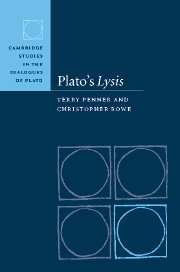Book contents
- Frontmatter
- Contents
- Preface
- PART I AN ANALYSIS OF THE LYSIS
- PART II THE THEORY OF THE LYSIS
- 10 A re-reading of the Lysis: some preliminaries
- 11 A re-reading of the Lysis
- 12 On seeking the good of others independently of one's own good; and other unfinished business
- Epilogue
- Translation of the Lysis
- Bibliography
- Index of names
- Index of subjects
10 - A re-reading of the Lysis: some preliminaries
Published online by Cambridge University Press: 22 September 2009
- Frontmatter
- Contents
- Preface
- PART I AN ANALYSIS OF THE LYSIS
- PART II THE THEORY OF THE LYSIS
- 10 A re-reading of the Lysis: some preliminaries
- 11 A re-reading of the Lysis
- 12 On seeking the good of others independently of one's own good; and other unfinished business
- Epilogue
- Translation of the Lysis
- Bibliography
- Index of names
- Index of subjects
Summary
SOME METHODOLOGICAL PROLEGOMENA; AND A MAJOR OBJECTION FROM PROPONENTS OF THE ‘ANALYTICAL–ELENCTIC’ APPROACH
In this second part of the book, we propose a second trip through the Lysis – this time with some philosophically more adventurous, and so more controversial, explanations (which will also be more pointed and more single focus) of the course of its argument as a whole. These explanations are more adventurous, first, by virtue of the extent to which they elaborate on what the claims are that we regard as clear enough allusions, in the text of the Lysis, to Socratic claims made explicitly only in other dialogues of Plato – as explicitly, at any rate, as Plato's Socrates ever claims anything. Then, beyond that, in a second degree of adventurousness, we also make use of other Socratic claims – claims not alluded to in the Lysis, though required in order to see just how we are to take those claims that are alluded to. What this gives us is an entire web of interlocking claims about knowledge, desire, love and the good. All of these claims – we propose – are involved in the argument of the dialogue, and if we are fully to understand that argument, we need to take cognizance of all of them. It is true that the Lysis itself presents just one perspective on this complex web, placing some of its aspects (claims, beliefs) more to the fore, others more in the background.
- Type
- Chapter
- Information
- Plato's Lysis , pp. 195 - 230Publisher: Cambridge University PressPrint publication year: 2005

